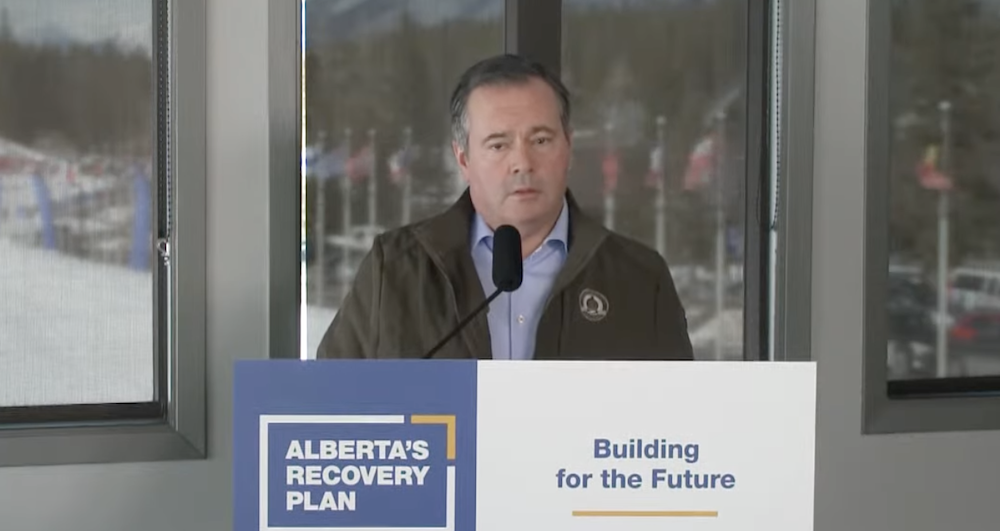Alberta Premier Jason Kenney has filed his statement of defence in response to a defamation lawsuit by five environmental organizations, offering a grab-bag of defences for the comments that sparked the dispute.
Among them, Kenney argues that by not specifically naming the groups he attacked in his social media comments about the findings of the so-called “Public Inquiry into Anti-Alberta Energy Campaigns,” which his government initiated, he therefore didn’t identify them.
“The Facebook Post and the Tweet do not mention any of the Plaintiffs, nor do they link to the Web Page or the Key Findings Document,” says the statement of defence.
That’s an interesting approach, since all five organizations were named in the report of inquiry commissioner Steve Allan, along with many others. So was the statement of defence’s use of the “responsible communication on a matter of public interest defence.” Introduced into Canadian jurisprudence in 2009, that defamation defence is generally thought of as being for journalists, bloggers and the like who make honest errors while intending to accurately report on matters of public interest.
If Kenney succeeds in extending that protection to public figures and their issues managers who publish acerbic tweets, that will be a significant development in the law of defamation.
Beyond that, the defences offered seem to this non-lawyer to be pretty standard boilerplate stuff: nothing that was said was defamatory, the statements made were all true, the words complained of were a fair comment on a matter of public interest, there was no damage to the plaintiffs’ reputations, and there was no malice.
Indeed, the statement of claim suggests, the words complained of may have helped the plaintiffs—“the Plaintiffs’ reputations have increased among activists who oppose oil and gas development, throughout Canada and elsewhere.”
Readers should remember that in defamation law, the term malice is used a little more broadly than in ordinary discourse. “As the Premier of Alberta, Premier Kenney has a responsibility to advocate for Albertans,” the statement of defence argues. “This responsibility applies particularly where outside interests engage in coordinated campaigns that (intentionally or not) threaten the economic prosperity of Alberta and Albertans. This was the factual context for the Facebook Post and Tweet.”
In their statement of claim early last month, the five plaintiff organizations alleged Kenney personally deliberately misrepresented the findings of Allan’s report, which found no wrongdoing by any organization, with the intention of defaming them.
Like some of the premier’s arguments, suing a government for defamation is unusual. Nevertheless, the Alberta Proceedings Against the Crown Act states that “the Crown is subject to all those liabilities in tort to which, if it were a person of full age and capacity, it would be subject.” (In the United States, interestingly, no judicial remedy exists when a federal official defames someone.)
Asked about the statement of defence at a news conference in Canmore Friday, Kenney responded snippily, telling reporters, “I find it fascinating that they were willing to dump millions of dollars into political and legal efforts to undermine Canadian energy exports and they’re now shocked that somebody’s actually shining a spotlight on those efforts.”
“Obviously, we’re not going to apologize, we’re simply telling the truth about what they’ve done,” he said. “They should apologize. They should apologize for allowing the world’s worst regimes to have a larger share of global energy markets.”
The plaintiffs’ lawyer, Paul Champ, well known for his recent efforts to get the so-called Freedom Convoy to stop honking their horns and go home during their illegal occupation of Ottawa, told the Canadian Press the statement of defence means the fight likely will end up in court. It’s pretty hard to find a flaw in that assessment.
The five plaintiffs are West Coast Environmental Law, the Dogwood Initiative, Stand.earth, Environmental Defence Canada, and the Western Canada Wilderness Committee.
The organizations are seeking $15,000 each in actual damages and $500,000 in punitive damages fromKenney, “to dissuade him and other Canadian public officials from using the power of their office to bully their critics.”



